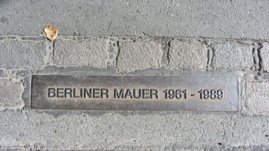
This year, on November 9, we commemorate the 25th anniversary of the fall of the Berlin wall. The Berlin wall stands for the wall that during the Cold War divided Europe into a western and an eastern hemisphere. This wall, that was planned nearly 70 years ago in Yalta in February 1945, was first devised 110 years ago by the British geostrategist Halford J. Mackinder1. Mackinder saw the unification of the Eurasian continent, especially the association of Germany and Russia, as the biggest threat to the countries of the “insular crescent”.
Since Mackinder, the maxim of Anglo-Saxon geopolitics, which determined especially their actions during the first and second world war, has been to prevent such an unification of the Eurasian “heartland”. This has been demonstrated by the work of many researchers, who have scratched at the surface of what is being taught in history classes. The italo-american economist G.G.Preparata has shown2, that the economic construction of the treaty of Versailles, especially the non-cancellation of the German war debts and non-confiscation of the wealth of the German financial elites, incubated the taking of power through the Nazis, and how the cooperation of Montagu Norman and Hjalmar Schacht engineered the construction of the German war machine and how diplomatically and secretly Britain set up unleashing the devastating “Operation Barbarossa”.
So in 2014 we not only commemorate the 25th anniversary of the Berlin wall, but also the 76th anniversary of the Nazi Pogrom of 9.11.1938 and the 75th anniversary of the beginning of the Second World War.
By the two world wars, whose length and catastrophic dimensions were not created by fate, but by men, Europe has seen too many soldiers and civilians (especially Russian) loosing their life, being wounded or being severely traumatized.3 But the suffering did not stop in 1945. The wall, that was to divide Europe and that had been agreed upon by Churchill and Stalin in Yalta, caused immense suffering in the German population, who were being driven out of the land east of this wall (Oder-Neisse), estimates of causalities range from 2,1 million (allied numbers) to 6 million (Adenauer). 4
In 1961 during the culmination of the cold war, out of weakness Ulbricht's GDR was forced to erect a physical wall to stabilize its western border. When it came down 25 years ago, for a short moment, there seemed to be the chance, that the citizens of the GDR (and of the other central European states) would be able to transform their societies.5 But this was an illusion. Plans to transform the east-German economy, like those of Rohwedder6, who was murdered by terrorists, were abandoned and instead of “Blühende Landschaften”7 we had to witness a share-holder-value style “transformation”.
Today we see that the same geopolitics and the same financial manipulations are going on since at least 110 years. The main difference today is, that we have now a multi-polar world emerging with a BRICS leadership, who focuses on containing the US and building a new economic world order.8 In Europe we have seen de Gaulle/Adenauer laying the foundations for the European community, Mitterand/Kohl managing the re-unification of Europe and Chirac/Schröder building an Eurasian alliance with Putin, but this has also caused the trans-atlantist overtaking of European leadership.
So now we have a leadership that does not serve European interests, but we also have a new generation, that grew up with west/east, and especially German-Russian reconciliation, with the ERASMUS program and with the elimination of European borders and walls. In this situation we need to strengthen the existing Euro-BRICS network (which is the countermeasure to the old geopolitics) and develop scenarios for the transformation of Europe, so the next European leadership to come is supported by a strong European civil society.
Christel Hahn
Tengen, Germany
2 G.G.Preparata: Conjuring Hitler, http://guidopreparata.com/
3 Systemic family therapy (Hellinger) has shown, that severe traumas, if not resolved, are carried on to the next generations in a family, see also
http://www.yadvashem.org/yv/en/education/languages/dutch/pdf/kellermann.pdf
4 Canadian author James Bacque in his book “Crimes and Mercies” also investigates the number of causalities among German POW'S and normal civilians (mostly from starvation) and comes up with minimum 9,3 German deaths caused by allied post-war politics.
5 Daniela Dahn: Wir sind der Staat,
http://www.danieladahn.de/index.php?section=buecher&func=rezension&buch_id=19
7 “Flowering landscapes”, with this slogan Kohl won the elections.

 The Fall of the Berlin Wall - A German Perspective
The Fall of the Berlin Wall - A German Perspective

 And now Mr Bush lets talk about Abu Ghraib and Guantanamo
And now Mr Bush lets talk about Abu Ghraib and Guantanamo

